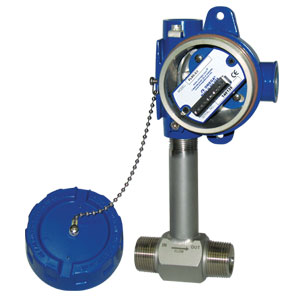Gas Turbine and Transmitter Systems with ATEX Enclosures |
| SYS/FTBG-100 Series |
|
 |
|
|
Gas Turbine and Transmitter Systems with ATEX Enclosures
 |
| Click for larger image. |
|
|
|
|
|
|
 |
OMEGA’s high accuracy Gas
Turbine Series measures the
volumetric flow of gas through a
pipeline. Gas flowing through the
meter turns the turbine rotor at an
angular velocity which is
proportional to the velocity of the
gas being measured. As the
turbine rotor turns, the rotor blades
pass a non-intrusive pickup coil that
generates an electrical signal,
referred to as a pulse. Each pulse
represents a specific volume of gas
(i.e. ACF/AM3). The totalization of these
pulses results in the total volumetric flow. The total
volume can be converted to mass flow total (SCF or
NM3) using reference conditions and base density, or
by applying various correction techniques.
Standard calibrations for these gas turbine systems
are performed at a reference density of 0.1 lb/Ft3. A
10-point calibration certificate (traceable to NIST or
other recognized national laboratory) is supplied with
each meter. Standard calibration includes a calculated
K-factor for gas that is derived from a 10-point NIST
calibration for water. Calibrations at customer’s actual
operating densities can be performed with special
order.
OMEGA’s gas turbine flowmeters offer high accuracy
measurement of gases for a wide variety of applications,
including fiscal measurement, plant cost allocation,
energy consumption/conservation, etc. These gas
turbine systems are suitable for all non-corrosive
gases such as natural gas, air and nitrogen. Special
versions of this series are available for use on
corrosive gases, such as “off-gas” and feature NACEMR175
trim and self-lubricated ceramic ball bearings.
Contact OMEGA for further details.
An OMEGA™ gas turbine flowmeter should be chosen
so that it is operated within its most accurate range.
The capacity of a turbine flowmeter is based on the
actual volumetric flow rate and is expressed as actual
cubic feet (ACF) or actual cubic meters (AM3). The
lower limit of operation is a function of the gas density
and velocity.
SPECIFICATIONS (TURBINE)
Over-range: 150% of maximum flow (intermittently)
Turn Down Range: Dependent on gas density at user’s operating conditions
Linearity: ±1% of reading typical
Repeatability: ±0.25% over tabulated repeatable range
Available Temperature Range: -157 to 149°C (-250 to 300°F) continuous
End Fittings (Standard): NPT
Bearing Styles: Self-lubricating, ceramic hybrid ball bearings
Materials: 316/316L dual rated stainless steel with 17.4 pH rotor
SPECIFICATIONS (SIGNAL CONDITIONER)
Input Signal Type: MCP pickup
Input Frequency Range: 0.2 Hz to 4 KHz
Signal Level: 10 mV rms to 30 Vdc
Power Supply: 13 to 30 Vdc standard, 100 to 240 Vac (-AC) (optional), reverse polarity protection
Analog Output: 4 to 20 mA, 1 to 5V, 24 mA overflow condition (dip switch selectable)
Load Resistance: Max 650 Ù @ 24 Vdc
Accuracy: °0.02% of full scale
Temperature Drift: 40 ppm/°C
Pulse Output: 0 to 5V Recommended Minimum Load
Resistance: 50 KÙ
Pulse Scaling: Divide by 1,10,100 per flow unit of measure
Hi/Lo Alarm (Optional): Relay (2A, 30 Vdc), 0 to 5V, open collector (0.5A, 30V)
Communications: RS232 port for configuration and diagnostics
Linearization: Up to 20 points
Operating Temperature: -40 to 85°C (-40 to 185°F)
Humidity: 0 to 90% non-condensing
Enclosure: Extruded aluminum explosion-proof ATEX
Port: 3/4-14 NPT
Regulatory: CE compliant
|
|
|
 |
|
 |
† Price are shown in RMB.
Note: Systems come complete with NIST certificate with K Factor, turbine, signal conditioner in ATEX enclosure, and operator’s manual.
± The purchase of FLSC-C-CABLE and downloadable software (free at FTP.Omega.com) are necessary to program the signal conditioners in the field.
For units with 100 to 240 Vac power, add suffix "-VAC" to model number, add $150 to cost.
|
|
 |
|
 |
|  |
|
Back to top

|
|
|
